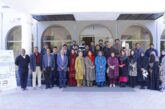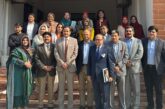
DI KHAN: Pakistan Army announcement that repatriation of the internally displaced people (IDPs) will begin from February 2015 may have come as a relief to many of the displaced families from tribal areas but the Mahsud tribesmen from South Waziristan are not sure where they will return to as most of them will be finding destroyed houses in their native areas.
Among the first of those displaced from the Federally Administered Tribal Areas (FATA) due to a military operation against the Taliban militants in 2009, the Mahsud tribesmen have been living in Dera Ismail Khan, Tank – towns neighboring South Waziristan – and other parts of the country such as Karachi for seven years now.
“I want to return to South Waziristan but my home was completely destroyed during the military operation,” said Fateh Khan, 63, a resident of Ladha in South Waziristan. Khan now lives in DI khan as a displaced person.
Fateh Khan said if the government rebuilt his home, he would consider going back to “live with dignity”.
Said Umer, FATA Disaster Management Authority’s coordinator for South Waziristan, told News Lens Pakistan, “A survey by FDMA in South Waziristan Agency to assess damages of the houses and public property during the military operation has revealed that 27,107 houses have been completely or partially destroyed whereas 80 percent of the houses were badly damaged.”
The military had cleared the Mahsud dominated areas of South Waziristan after a year of the operation that started in 2009. Umer said that the repatriation process of the people displaced by the operation started on 4 December 2010. About 11,924 families have repatriated till date but several thousands have yet to return.
“Due to the military operation in the neighboring North Waziristan, the repatriation process was stopped but it will start again in the first week of February 2015 after a registration process”, Nawab Safi, Assistant Political Officer South Waziristan Agency, told News Lens on the phone.
On 4th January 2015, Pakistan Army Chief General Raheel Sharif told an official meeting in Peshawar that the repatriation of IDPs to their native homes will begin from February 2015 in different phases.
Safi said the registration process will start in the first week of February. “Hopefully in the second week, the IDPs will return to newly cleared areas of Sararogha and Sarwakai,” said Safi.
FDMA’s coordinator Umer says that more than 900 rooms and shelters have been built by donor agencies. Saudi Arab has helped Pakistan build 300 small houses and also provided house building materials for the displaced people returning back.
According to Saleh Shah, a senator from South Waziristan, a proposal to allocate seven billion rupees as compensation for destroyed houses and other damages has been sent to Prime Minister Nawaz Sharif but it has yet to receive attention from the government.
“The government has reneged on its promises to compensate Mahsud IDPs for their damages,” said Saleh Shah.
Political Agent South Waziristan Islamzeb told News Lens that the IDPs would get help from the federal government and donor organizations just like those displaced from Swat, Bajaur and Mohmand Agency were compensated.
“The returning IDPs will get Rs 400,000 for fully damaged and Rs 160,000 for partially damaged houses,” he said.
Senator Saleh said that the government should provide IDPs financial assistance to undertake reconstruction of their houses: “The Mahsud people have suffered immensely both in terms of human and material losses in operation Rah-e-Nijat. Support from the government may help win the hearts and minds of the people of South Waziristan.”
While some of the Mahsud tribesmen are uncertain about their return home, others have welcomed the decision.
“It’s a very good decision because we are living a miserable life away from home,” said Sher Badshah, 45, who lives as an IDP in a rented house in the Dabara, neighborhood of District Tank. “Facilities like electricity and schools are available here in Tank but we don’t feel comfortable because it is not our area.”




